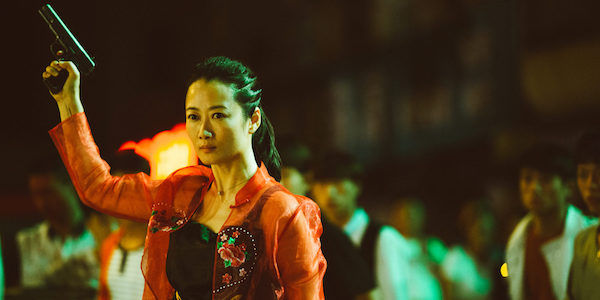It’s the year 2001 in China. The nation entered the World Trade Organization, its economy rises with the opportunity for urban employment, and the girlfriend of a mob boss is sentenced to five years in prison for firing an illegal firearm to save her lover’s life in an attack. This is the situation that opens Jia Zhangke‘s latest film Ash is Purest White, released on Blu-Ray earlier this month.
The film continues in 2006, and the released convict Qiao (Zhao Tao) finds herself in a changed society, one that developed into greater metropolises, big marketplaces and tourist traps. She must navigate this new face of the country to look for her boyfriend Bin (Liao Fan), who failed to visit her during incarceration. Along the way, and through all the tricks and beliefs of her old trade not working how they used to, Qiao discovers just how the years stopped being kind to the criminal underworld, and eventually, to her relationship.
Better Living Through Globalization
Jia Zhangke’s comparisons to the likes of Michelangelo Antonioni are inescapable in most film-seasoned circles. His trademarks that consist of long takes, and deliberate pacing to linger on alienation in the growing presence of Western capitalism in China is more consistent material than most others. Exploring isolation in this manner doesn’t stand out as much as the fascinating characters do, a constant in every Zhangke-film seen up to this point. There’s a documentary-like approach to the lives of these people that centers them among an environment that truly changes, starting with his 2015 film Mountains May Depart.

One could even say that Ash is Purest White retreads the ground of Mountains in the context of a genre film. What makes that assumption falter is the fact that the former is more grounded in one perspective to tell a story different from the love triangle and familial strifes of Mountains.
As the world changes and leaves behind the need for struggling to survive, it leaves behind those who didn’t learn any other way. These people living underneath the social ladder now understand the harshness of those who wish to stay morally and legally clean. The sequence in the film that cuts from the gangster couple dancing to the Village People’s “YMCA” to have the song play over early DV footage of workers lined up for consideration shows just how connected they’ll become. A future that will await them when the West, much like the song on the dance floor, becomes a recognizable force.
Slipping Into the Future
Even still, the more things change, they stay the same, just with the adjustments upon time. The scene that gives way to the film’s English title takes place near a volcano appears with an injured Bin on a grassy hill with Qiao. The culmination in the third act shows the same location nearly two decades later. The grass is brown, the volcano isn’t as vibrant, and Bin is there for the same purpose of struggling to walk–in this case, after a stroke and not a sudden assault.
Aging is the most telling change of the times. The couple’s love has clearly dwindled, or at least now it comes closer to mere dependency than the romance we’ve seen before. Their use to the world as regular workers has come to a pause, and now they literally go back to the start to continue on, desperately catching up with the development of values and technology.
It’s actually interesting to note that Zhengke followed that approach on a technical level to represent the years passing. Earlier, this article mentioned footage shot on Mini-DV, and they come with the Academy ration at times as well. But while those scenes are few and far between, they develop into being shot on film in those early 2000s, from 16 to 35mm (even several being handheld in 2001), before a noticeably more sleek and vivid Red One digital camera once we’re in 2017.
It’s a smart and almost unconscious measure to match the drifting through the years, and how all the available equipment is reflected through the look of the film, which on Blu-Ray, doesn’t call attention as much as it demands admiration. For anyone with a long investment in Jia Zhengke‘s artistry, it’s not hard to find what he achieves here to be another masterwork.
Conclusion: Ash is Purest White
The most simple sum of the film is how everything changes, but a changing nation such as China is most attractive to the constant winds, blowing every way to push its people into various directions. The current president is the first one since Mao Zedong to have a directly communist system in mind. Qiao is a streetwise woman who goes beyond being a gangster’s moll, especially when she’s released into society again and her cons keep her afloat while still dealing with the societal shift on her own. Bin is a man living on cool-as-ice gangster film mode, wearing a mustache and a cigarette with pride until times change, and his mannerisms are nondescript as he adjusts, like most others, to industrial work.
The new society isn’t kind to them, and Ash is Purest White in title alone recalls how all perceived purity comes from the natural world, and it’s the only sources of realness in a place that gets more wired and connected, but from a distance.
What other films by Jia Zhengke have you seen, if any? What other great films jump through time and the years as an extension of its theme?
Watch Ash is Purest White
Does content like this matter to you?
Become a Member and support film journalism. Unlock access to all of Film Inquiry`s great articles. Join a community of like-minded readers who are passionate about cinema - get access to our private members Network, give back to independent filmmakers, and more.